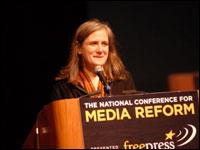Transcript
BETH FERTIG:
This is On the Media. I'm Beth Fertig.
BOB GARFIELD:
And I'm Bob Garfield. Last weekend, the organization Free Press hosted the National Conference for Media Reform for those who are, quote, "concerned about the state of our media and committed to working for change." Our producer Megan Ryan made the trip and brought back this postcard.
MEGAN RYAN:
On the weekend of Martin Luther King Day, in Memphis, Tennessee, where the Reverend was assassinated 39 years ago, Bill Moyers was constructing a metaphor about the state of American media today. Much to the concern of the crowd, deregulation has allowed media conglomerates to become –
BILL MOYERS:
- Goliaths, whose handful of owners controlled, commodified and monetized everyone and everything in sight. Call it the plantation mentality.
MEGAN RYAN:
He built his metaphor on the images of slaves and masters in pre-Civil War America.
BILL MOYERS:
As we saw in the run-up to the invasion of Iraq, the plantation mentality that governs Washington turned the press corps into sitting ducks for the war party, for government and neoconservative propaganda and manipulation.
MEGAN RYAN:
And when he brought the metaphor home, the thousands of people in the room, among them net neutrality activists, Indie muckrakers, bloggers, low-power FM deejays and YouTube users, all knew for sure why they'd gone to Memphis, to be part of a movement.
BILL MOYERS:
This is the moment freedom begins – the moment you realize someone else has been writing your story, and it's time you took the pen from his hand and started writing it yourself.
MEGAN RYAN:
Moyers was setting the tone for a weekend that examined a broad range of media topics that had at their core the idea that media reform is a civil rights issue.
JANE FONDA:
People of color have increasingly been marginalized as media monopolies grow.
MEGAN RYAN:
Jane Fonda.
JANE FONDA:
The media environment that is overwhelmingly white is also overwhelmingly male. Today, I hope to show you that a media that leaves women out is fundamentally, crucially flawed.
MEGAN RYAN:
Jane Fonda wasn't alone among stars. Danny Glover, Reverend Jesse Jackson and Geena Davis were there. Also on the roster, FCC commissioners Jonathan Adelstein and Michael Copps, a handful of congressmen and an impressive coalition of scholars.
But mostly, the halls were filled with citizens who care deeply about every aspect of media, the power, the pictures and the pipes.
SCOTT CHRISTENSEN:
My name is Scott Christensen. I'm from Columbia, Missouri, and I'm just interested in issues of media consolidation.
ANTHONY ARNOVE:
I'm Anthony Arnove. I'm from Brooklyn, New York. It's getting harder in some ways to get our books into commercial venues because of consolidation.
CAROL WINKLEMAN:
My name is Carol Winkleman, and I'm from Xavier University in Cincinnati, and I'm here to learn more about how the FCC works.
DAVID FRANKL:
David Frankl. I'm from Winchester, Massachusetts. Very interested, since the mid-'60s, in the independence of the media.
MEREDITH CISCO:
My name is Meredith Cisco and I'm from West Plains, Missouri. What brought me here is just curiosity about this movement and whether they're serious – and, by golly, they are.
MEGAN RYAN:
So serious and so focused on the injustices perpetrated by big media outlets that I found myself in one discussion defending the mainstream. Me? Producer of a show that takes pride in, you know, speaking truth to power? I felt that I had to point out that the major newspapers have broken a few important stories in the past several years. And, hey, CBS does have a woman anchoring the news.
But, I realized that this weekend wasn't about debate or about the few exceptions to the rules. It was about diving into an echo chamber of like-minded thinkers and having a good time. One attendee summed it up.
MEGAN RYAN [AT CONFERENCE]:
Have you met anyone at the conference who disagrees with you?
MAN:
No.
MEGAN RYAN:
I left Memphis with a message in a bottle, that there's a movement underway for anyone interested. Back to Bill Moyers' speech one more time.
BILL MOYERS:
And I'm going to let you in here on one of my fantasies. Keep it to yourself, if you will, because fantasies are private matters, and mine involves Amy Goodman.
[LAUGHTER]
But -
MEGAN RYAN:
Goodman is the host of a daily show on the Pacifica Radio Network. She was there, too, talking and signing books. Never mind the luminaries, the celebrities and household names. At this conference, Amy Goodman was the star. After all, Democracy Now, the name of her show, is the dream for this civil rights movement.
For On the Media, I'm Megan Ryan.


